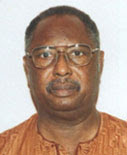
‘All I’m Doing is Giving People Information They Can’t Get from the Government,’ Says Yusupha Cham
Naomi Hunt, Press Freedom Adviser for Africa & the Middle East
The Gambian founder and managing director of Jollof News Online, Yusupha Cham, who lives in exile in Birmingham, UK, told IPI on Wednesday that he has received three emailed death threats since the beginning of the year. Copies of the emails were forwarded to the IPI Secretariat in Vienna.
The first email, from a Hotmail account, was sent in late January 2010. In it the writer warns Cham not to return to Gambia because “death await you in Banjul [sic]” as a result of “articles all over the Internet and on the Echo.” The Gambian Echo is an opposition website to which Cham has contributed several articles and editorials that heavily criticize Gambian President Yahyah Jammeh and his policies.
Cham received a second threatening email from “members of the Gambian security force, precisely the National Intelligent Agency [sic],” the next day. The author, calling himself Musa Jammeh, said that if Cham returned to Gambia his entry would be monitored and his “days will come soon.”
Cham responded to the first two threatening emails on 7 March with an editorial on the Jollof News website in which he declared that “no amount of intimidation can deter [the media] from continuing on this path we have already taken.”
Later in March, Cham received yet another threatening message, this time from someone claiming to be named Ismaila Sanyang. The email warns, “Consider UK your new home because if you dare step your foot on Gambian soil Mile 2 prison will pay host to you only if you are lucky enough to escape answering calls from your ancestors.”
The former Gambian sports journalist is now afraid of what will happen if he attempts to return to his home country. “I’m just afraid and I’m outraged,” he said. “I don’t know why they are threatening my life. All I’m doing is giving the people information that they can’t get from the government.” He added: “No amount of threat will deter me from carrying on.”
“We are concerned by Mr. Cham’s reports that he has received death threats” said IPI Director David Dadge. “If any of these threats do indeed originate with the Gambian security forces, as was claimed in one of the emails Mr. Cham received, it is vital that President Yahyah Jammeh ensures that officers in the army treat every citizen of the Gambia with respect and in accordance with national and international law.”
If the threats originate with hoaxers then it is again the responsibility of the Gambian authorities to investigate the source of these illegal threats and bring the perpetrators to book,” Dadge said. “Journalists should be allowed to report on news, no matter how critical, without fear for their freedom or their lives, or the safety of their families. Acceptance of this fact is an essential first step towards creating press freedom in Gambia.”
Cham launched Jollof News online, which exclusively covers political issues, in January. The website now has over 5,000 visitors a day, Cham told IPI. The former sports reporter now turned political commentator has contributed to several Gambian online opposition news websites. In his work, he has repeatedly lambasted the government of Gambian President Yahyah Jammeh, and the Gambian security forces over their alleged corruption, impunity and the regime’s alleged implication in the murder of well-known Gambian editor Deyda Hydara. Cham also owns and operates a Gambian sports website, gamsports.com.
Until he left the Gambia in 2006, Cham worked as a sports editor for the independent newspaper the Point. In December 2004, the Point’s editor-in-chief and co-founder Deyda Hydara was shot to death, just days after he published editorials expressing his intention to challenge two new press laws that many believed have constricted the media in the small West African country. Journalists at the daily paper have subsequently been the target of spurious law suits and criminal charges, which IPI has repeatedly condemned as politically-motivated acts against reporters who are exercising their right to criticize government policy and practice investigative journalism. Soource:
IPI








